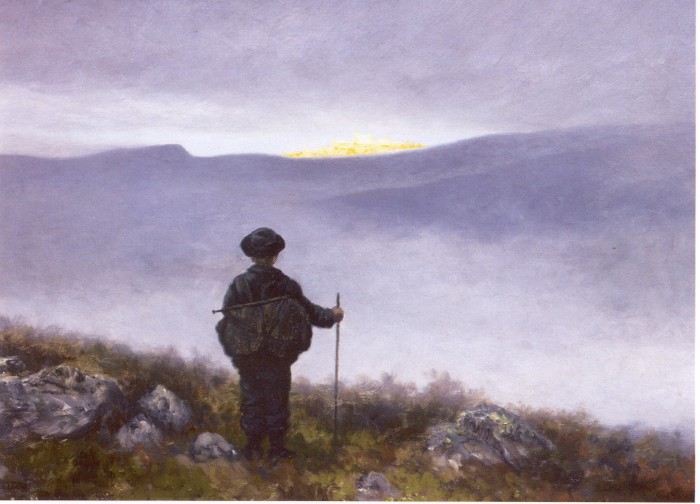On the night of Thursday, September 25th, I did not sleep.
Icy dew collected on the sand around me and shone in the starlight. I marched in circles—endless circles—to keep warm, for I had left my sleeping bag and other gear a long ways off. My headlamp was running out of batteries. Too quickly, my fire had turned to ash.
On the last night of my vision fast I had created a “purpose circle,” a common ritual for the fourth night of this journey. Essentially, you create a circle and stay awake in it from sundown to sunup. By accident, I had stranded myself there, inadvertently committing myself to the ritual by offering myself no recourse.
There I was. No moon illuminated the sky that night. A nearly imperceptible light above the mountains taunted me with the prospect of dawn. The stars spun. The earth grew cold and damp.
At dawn on Friday, September 26th, I eagerly returned to base camp, where I would receive food and human company for the first time in four days. After 12 hours of wrestling with my emergency blanket, dozing off and waking up chilled to the bone, and generally waiting to have enough light to return, I scarcely saw the colors of the rising sun in my hurry.
When dawn finally lifted her veil and rose above the horizon, nothing had happened. I had not slept. I was cold, and I was hungry. In terms of my hopes and intentions for my journey, I had failed.
How do we go “back” after a life-altering, or even life-nudging, experience? A long journey, a recovery from illness, a break-up or, most difficult of all, a failure—these things change the very fiber of our being. Such experiences weave new threads into our histories and alter our perceptions of the world. How do we return to the same place we began?
The guides for my group encouraged us to consider our experiences in terms of Joseph Campbell’s, “Hero’s Journey.” First, there is a call to adventure (my sudden, inexplicable urge to go on a vision quest). Then, entry into a realm of primal forces (I go out into the woods alone for four days, hoping to meet myself there).
Finally, there is the Return, and this is often the hardest part.
In Homer’s epic, “The Odyssey,” Odysseus faces monsters and demons, dark magic and stormy seas on his journey home from the Trojan War, but it is upon his return that he faces the greatest danger of all: his own people.
The story of the Odyssey is an allegory for what we all face when, after traveling a great way (in spirit, mind or body), we return home—or, the preferred euphemism in my group, we return “to the other side of the trees.”
On our way back to Putney, Vermont, we hadn’t been driving an hour when a car moving at full speed rear-ended us while we were stopped at a crosswalk. Welcome back to the other side of the trees! Nobody was seriously injured, but we were flustered. Most of all, the accident drove home the idea that the Return can be more challenging than all the rest.
I had survived one of the darkest, coldest, loneliest nights of my life, but now I had to talk about it, to reconnect with my daily life and the people in it, and to nurture the new, unfamiliar filaments now woven into my being.
How do we return mindfully, with grace and self-care, from any kind of journey? Even more perplexing for me, how do we return mindfully, with grace and honesty, when we have failed in our endeavors?
For me, the answer has lain in writing, in storytelling, and in sharing those new threads openly, but selectively.
It briefly crossed my mind that I could lie. I could invent a triumphant, magical, visionary experience, and nobody would know.
But finally, the truth is more interesting. The truth is messy and disappointing and hard and unflattering, but the truth is a story worth telling.
The answer has also lain in knowing when to respond, “I don’t know.”
My first night back, I had a shift at the restaurant where I work, and one of my coworkers asked, “So how was your vision… search… fast… whatever… thing?”
“I don’t know yet,” I said. Sometimes an experience is too raw, too strange and undefined, to share with just anybody. And yes, by sharing my words online, I am in a way sharing with “anyone,” but I expect these readers may be a more sympathetic group than some of the people in my immediate vicinity.
Finally, how do we transmute failure or disappointment into something productive and beautiful?
My answer: we realize that in falling we can fly. We grow in many ways, and sometimes we grow down, and sometimes we fall up.
I am trying to embrace my “failures” for what they are— strands of my soul that render it stronger and more complex.
How, then, do we return from a journey mindfully, with grace? We tell the truth: we fell; we flew; we failed; we grew. We have a story to share. It is strange and messy and nonsensical and beautiful. We offer it as a gift to those who wish to receive it.
Love elephant and want to go steady?
Sign up for our (curated) daily and weekly newsletters!
~
~
Editor: Travis May
Photo:Wiki Commons

 Share on bsky
Share on bsky







Read 0 comments and reply